|
|
Australian travel with a difference. Explore the plastic bag issue with our two GEJI reporters from the University of Hamburg, Imke Emmerich and Laura Schneider.
Watch a video of Imke Emmerich and Laura Schneider talking about their findings in Sydney:

Click To Play
Shushu He
Sydney supermarket shoppers are using more new plastic bags than those in other major cities, including Melbourne, London and Hong Kong, according to a survey of more than 4000 customers conducted by University of Technology journalism students in March this year.
The Sydney survey, which was part of a Global and Environmental Journalism Initiative (GEJI) survey of 7000 shoppers across Melbourne, Hong Kong and London over several weeks in late March, found that Sydney customers used 2.1 new plastic bags per customer compared to 2 in Melbourne, 1.7 in London and 0.79 in Hong Kong. (Fig. one)
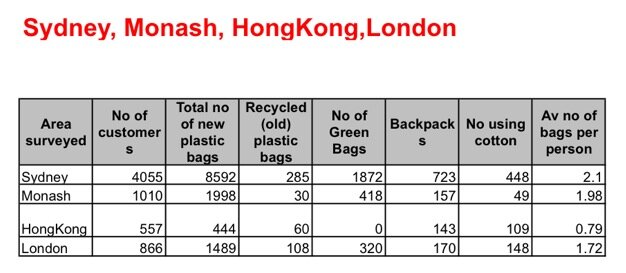
Fig. 1: Four city comparison (Sydney, Melbourne, Hong Kong, London).
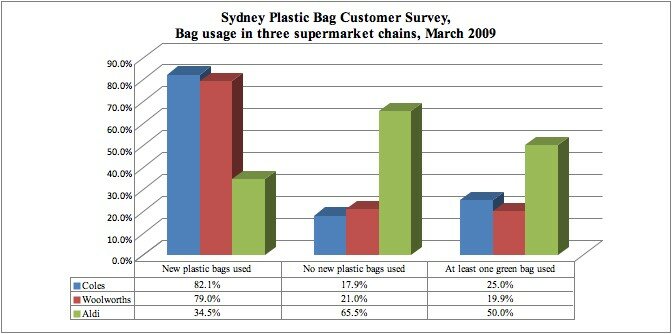
Fig 2: Sydney plastic bags in supermarket chains
79% of Sydney shoppers still left the supermarket carrying new plastic bags. In Sydney’s inner western, southern and north-western suburbs, more than 82% of customers took plastic bags.
The results for the two major Australian supermarket chains which between them control almost 60 % of the Australian supermarket retail market, were even higher than the Sydney wide figures. Coles customers used the most plastic bags averaging averaging 2.5 per person and Woolworths customers using 2.37 per person. Customers at the German owned Aldi supermarket which charges for plastic bags used only .59 bags each.
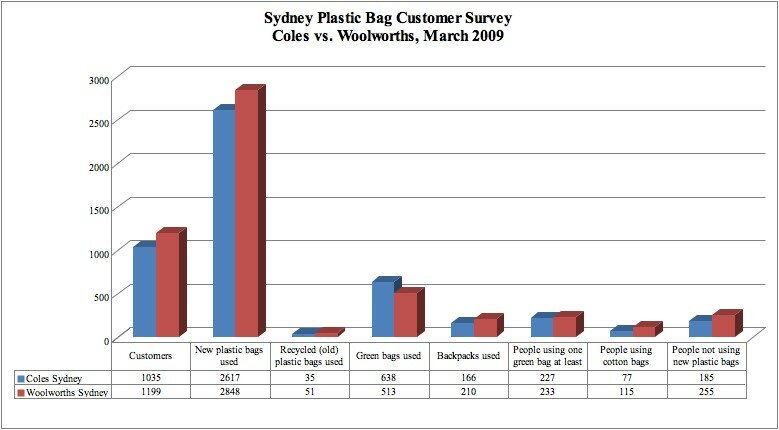
Fig 3: Supermarket head-to-head: Coles vs Woolworths
These results show that voluntary attempts to reduce plastic bag use in Australia have been unsuccessful. In 2002, Australia’s major retailers developed a voluntary code which would reduce plastic bags by half by the end of 2005 and phase them out by 2008. The agreement expired in 2005 with a reduction of only 34%. According to a survey commissioned by the Federal Environment and Heritage Council, in 2007 the national downward trend reversed with a 17% increase in the use of light (HDPE) plastic bag use from 3.36 to 3.93 billion plastic bags.
The two chains, Coles and Woolworths have consistently argued against introducing levies and bans on plastic bags, both of which have been successful in reducing usage elsewhere.
The survey showed that on a widespread basis, Woolworths are failing to implement their official policy of not offering plastic bags to customers who purchase very few items. Direct of observations of hundreds of cashiers at supermarkets across Sydney and Melbourne revealed that many checkout cashiers ignore or are not aware of the policy. Coles, who do not have a firm policy on this issue but leave it to the discretion of cashiers and shoppers, also regularly offer plastic bags to shoppers with one or two items.
When asked about the GEJI survey findings, a Woolworths spokesperson blamed customer behaviour and insufficient staff training.
“The challenge is really behavioural – getting the customer to bring the reusable bags to the shop,” Ms Buchanan said.
“The problem is the customer doesn’t always know when they will do their shopping next.”
“Most people shop two and a half times a week. The days of one big family visit to the shopping centres on the weekend are really over – it doesn’t really happen anymore.”
“Staff training is a huge challenge. Have to keep in mind that we have a turnover of 49 percent of staff every year. “The other challenge is customers who want plastic. They may have uses for the bags in the home as bin liners or for their pets.”
Unexpectedly, the highest percentage of people using new plastic bags was in the Sydney’s inner west, which has the highest percentage of Green Party voters in Australia. 83. 2 % of customers in Newtown and Glebe used new plastic bags and only 9.5 % used reusable Green Bags, again lower than in any other area. The inner West still had the lowest per capita use as they tend be students or customers shopping on their way to and from work to do smaller shops and they therefore tended to use less plastic bags per person.
82.1% of customers in North West Sydney (Castle Hill and Cherrybrook) and 82. 2 % of customers in the South region (Hurstville and Miranda used new plastic bags.
♦♦♦♦♦♦♦♦♦♦♦♦♦♦♦♦♦♦♦♦♦♦♦♦♦♦♦♦♦♦♦♦♦♦♦♦♦♦♦♦♦♦♦♦♦♦♦♦♦♦♦♦♦♦♦♦♦
Follow us on Twitter: Gejinews2
Rachel Pieris and Andrew Stewart
Employees at a major supermarket are not enforcing any policies on plastic bags, and failing to encourage the use of environmentally friendly Green Bags.
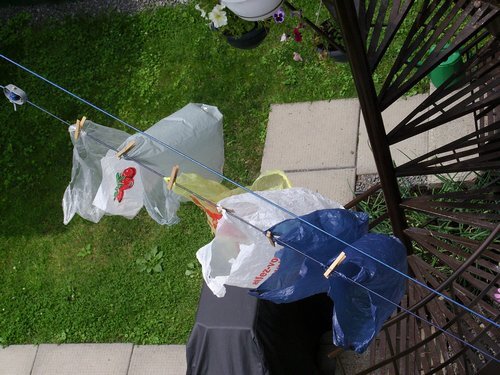
Photo by Vieux Bandit
Cashiers at the 12-items-or-less section of Coles at Broadway were observed placing less than three items into plastic bags and not encouraging the Green Bags option, an action that is against the Australian Retailers Association recommended code of conduct that Coles has signed on to.
Store duty manager, Riasat Kamal, 31, said: “We need more communication with our staff – although we have reached our goal of reducing plastic bag usage by 50% since a year and a half ago.”
During half-an-hour of transactions, the only time Green Bags were used was when the customer asked or provided their own. On all occasions, the cashier put the items straight into a plastic bag without asking or offering a green bag.
“Our green bags are displayed clearly at all major aisles,” Mr Kamal said. However, the green bags are not displayed at any of the twelve-items-or-less registers.
Despite Coles’ attempts to reduce plastic bags, the local community does not seem to be making good use of the Green Bag option.
Matthew McGregor, a carpenter from Ebenezer said: “When I go shopping my stuff is always put in plastic bags”.
University student, Rebecca Harper, 20, from Newtown, agrees. “If I forget to bring my own bag then I just end up bombarded with plastic bags,” she said.
Woolworths appears to be making more of an effort than Coles. Eva Nurray, 43, a mother from Enmore and regular shopper at Woolworths Newtown, has noticed an improvement. “I do try and take my own bag and catch public transport,” she said.
Olive Jarvis, a 70-year-old retiree from Glebe, has been bringing her own bag for many years because environmental protection is taken seriously in her family. “I’m a big believer in climate change,” she said. “My father is a fisherman and he noticed changes in the fishing conditions at Nowra over many years.”
..
Observations at the 12-items-or-less aisle at Coles Broadway
| Transaction |
Number of items |
Asked if customer wanted plastic bag? |
Were the items put automatically in plastic bag? |
| #1 |
3 |
No |
Yes |
| #2 |
6 |
No |
Yes |
| #3 |
5 |
No |
Yes |
| #4 |
2 |
No |
Yes |
| #5 |
1 |
No |
Yes |
| #6 |
1 |
No |
Yes |
| #7 |
1 |
No |
Yes (customer asked if item could not be in a plastic bag) |
| #8 |
3 |
No |
Yes |
| #9 |
7 |
No |
Yes (customer asked if items could be put straight into his own green bag) |
| #10 |
6 |
No |
Yes |
| #11 |
2 |
Yes |
No |
| #12 |
1 |
Yes |
No |
| #13 |
2 |
No |
Yes |
♦♦♦♦♦♦♦♦♦♦♦♦♦♦♦♦♦♦♦♦♦♦♦♦♦♦♦♦♦♦♦♦♦♦♦♦♦♦♦♦♦♦♦♦♦♦♦♦♦♦♦♦♦♦♦♦♦
Follow us on Twitter: Gejinews
Olivia Pickering and Bonnie Rando Leys
Consumers’ plastic bag usage is largely influenced by supermarket policy, according to a survey of Coles and ALDI stores in Manly.
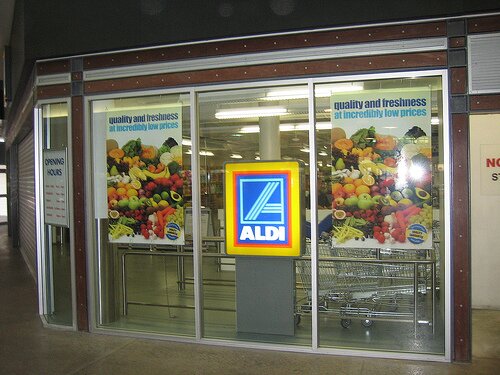
ALDI in Manly - Photo by Safaris
Currently, there is no Coles policy that dictates that cashiers should ask customers if they would like a bag for three items or less. But in contrast, ALDI stores implement a 15-cent fee for each plastic bag and actively encourages customers to bring their own bags or boxes from home.
Assistant manager of ALDI Manly, Matthew West, said: “Charging for plastic bags enables us to keep costs down, which makes it cheaper for the customers and better for the environment”.
At the time of the survey Coles did not consistently enact a plastic bag policy. UTS GEJI journalists observed that 35 per cent of customers served were not asked before being given a plastic bag for their purchases.
Of those who were asked, 40 per cent declined the use of a plastic bag. This suggests that had cashiers adhered to policy, 14 per cent fewer bags could have been ued.
When asked about this issue, the Store Manager for Coles Manly Corso supermarket refused to comment.
The absence of a clear Coles policy is denying customers the choice to go “bag-free”, according to local residents. Simple plastic-bag reduction policy in supermarkets could substantially reduce consumer impact on the environment and climate change.
Kelly Davies, 32, of Dee Why said: “I don’t know why we don’t pay for our plastic bags here when you do overseas. I don’t mind paying for them or using my own”.
Julie Phillips, 27, of Dee Why agreed, and said: “I think we have a big impact on [climate change] definitely…we’re all guilty.”
♦♦♦♦♦♦♦♦♦♦♦♦♦♦♦♦♦♦♦♦♦♦♦♦♦♦♦♦♦♦♦♦♦♦♦♦♦♦♦♦♦♦♦♦♦♦♦♦♦♦♦♦♦♦♦♦♦
Follow us on Twitter: Gejinews
Hollie Azzopardi and Natasha Kosteska
Plastic bags continue to be the popular choice for supermarket consumers as Coles staff fail to suggest a greener option.
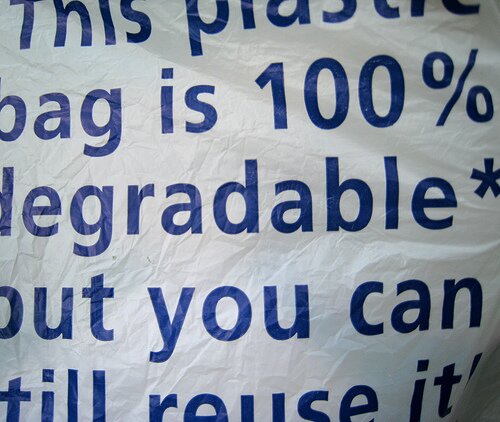
Photo by PSD
Staff at Edgecliff Coles, located in Eastpoint Food Fair, failed to ask customers if they wanted a plastic bag when buying three items or less, despite this being a well-advertised policy at the store.
The store’s manager, who asked no to be named, refused to comment on the issue, claiming it should be taken up with Coles Customer or Media Relations. Both departments also declined an interview.
The display of Green Bags at each checkout does not seem to be enough to encourage customers to use them, with cashiers mostly placing purchases directly into plastic.
Twelve shoppers seen buying less than three items were not given the ‘green option’, and three shoppers with Green Bags were given their goods in a plastic bag, regardless of store policy to minimise this.
An observation of the Edgecliff Coles showed that of 44 customers buying over three items, only three used a Green Bag. Thirty-five shoppers used plastic, with six using a mixture of plastic and reusable bags.
Sara Bennett, 67, and an ABS interviewer from Watsons Bay, refuses to use plastic bags as she believes it contributes to climate change.
“I use calico bags when I shop, not plastic, and I think it’s good that places like Bunnings are charging for their plastic bags,” she said.
Public concern about climate change is still an issue. William Law, 20, and a Navy worker from Cronulla, said: “[Climate change] is definitely a big issue –and we’re not helping things. People are ignorant. It should be a one in, all in issue.”
Pat Hogan, a 42-year-old carpenter from Ireland, thinks the media is the number one informant of climate change. “I’ve learned about climate change through the media, mostly newspapers and television,” he said.
Ms Bennet agrees, claiming films like An Inconvenient Truth are a good medium for public awareness. “[The movie] was definitely the turning point for me,” she said. “We are misusing our planet.”
♦♦♦♦♦♦♦♦♦♦♦♦♦♦♦♦♦♦♦♦♦♦♦♦♦♦♦♦♦♦♦♦♦♦♦♦♦♦♦♦♦♦♦♦♦♦♦♦♦♦♦♦♦♦♦♦♦
Follow us on Twitter: Gejinews
Caitlin Hill and Danielle Le Toullec
People are still not fully aware of issues at the core of climate change, despite Green Bags flooding our shopping centres and supermarket shelves.
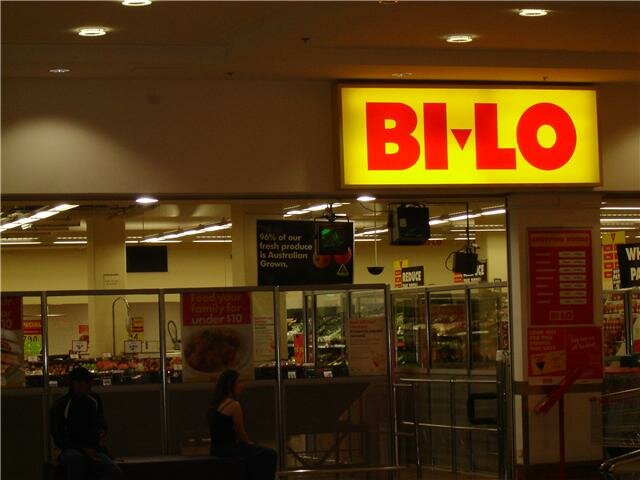
Photo by Caitlin Hill, Danielle Le Toullec
A recent field study at Broadway Shopping Centre found that customers mainly use Green Bags because of social pressures, and not moral reasons or an awareness of climate change.
David Hanrahan, assistant store manager at Broadway BI-LO, said that his store was phasing out the use of plastic bags and bringing in more Green Bags, “We are already going through heaps every week, maybe a couple of hundred.”
However when asked what influenced BI-LO to stock for different types of Landcare Green Bags, priced from 99c to $3, Mr Hanrahan said: “It’s mostly customer demand”.
In 2004, figures were released announcing that 20 million Australians used 6.9 billion plastic bags annually. In response to this, the NSW Labor government put forward a motion to phase out plastic bag usage.
Since then figures have significantly decreased. The Australian Bureau of Statistics recorded that Australians are now using 4 billion plastic bags annually.
However on observation at the Broadway Shopping Centre, it is evident that plastic bags are still the predominant option.
Sara Gaudry, a 36-year-old mother of Hunters Hill, agreed, saying: “I try to make an effort to use the Green Bags, although I don’t use them every time.
Climate change is definitely an issue but I don’t know much about it.”
Although the Green Bags are visible and easily accessible at BI-LO, Coles and K-Mart, many consumers are still using plastic bags. During a one-hour observation, not one customer purchased a Green Bag.
In an effort to increase the number of Green Bag users, Kmart stocks a variety of bags with popular logos, such as WWF wrestling, and also incorporates fashionable colours, urging customers to “Make an Impact” by purchasing the alternatives.
Sela Takai, a 24-year-old Broadway K-Mart employee, said: “Although we ask each customer if they want a Green Bag, only about one in 10 customers actually use them.
“We are interested in doing what we can to help the environment. I know a bit about [environmental] issues from the news but I don’t really know that much. Just that water levels are rising from greenhouse gases.”
In contrast to the major stores, customers of the Oxfam Shop in Broadway are given the option of either paper bags or calico bags that cost $2.50.
Mathew Parnham, store manager of the Broadway Oxfam Shop, said: “We are an ethical business. The majority of people don’t take a bag, they have other bags that they use … Our customers tend to use the green shopping bags though.”
When asked about his knowledge of climate change, Mathew attributed much of the damage to “pollution, pollution, pollution”.
“For Oxfam, it is a serious issue that has stemmed from necessity rather than consumer demand.”
Michael Winter, a 19-year-old international studies student from Burwood and Oxfam customer, said: “I mostly get information [about climate change] from the TV, Al Gore … information influences you, so it’s a moral thing.”
♦♦♦♦♦♦♦♦♦♦♦♦♦♦♦♦♦♦♦♦♦♦♦♦♦♦♦♦♦♦♦♦♦♦♦♦♦♦♦♦♦♦♦♦♦♦♦♦♦♦♦♦♦♦♦♦♦
Follow us on Twitter: Gejinews
Julian Mark and Shazana Zulkiffli
Coles at Surry Hills, part of one of Australia’s major supermarket chains, does not have an in-house policy when it comes to dispensing plastic bags to its customers.
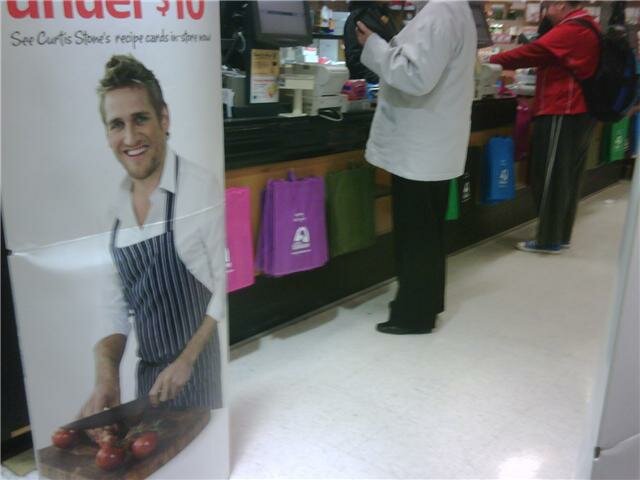
Photo by Jacqui Henderson, Livia Parsito, Yammi Lee
Sherley Sitiawan, 27, and Service Manager at Coles Surry Hills, revealed that there is no policy around the use of plastic bags or Green Bags at her store.
“If we ask the customer if they need a plastic bag, and they need it, then we give it to them, but if they don’t, we just don’t give it to them,” she said. “But we don’t have a policy saying that we’re not allowed to give plastic bags for less than two items.”
Richard Ensworth, a 48-year-old psychologist from Coogee, said that he is never given the option of a plastic bag alternative, no matter what store he is in. “It’s just black or white, you get a plastic bag or you have a special bag,” he said.
Coles signed onto the Australian Retailers Association code of conduct for plastic bags that set targets for supermarkets to reach over the 2003-2005 period. There is nothing in the code that mandates retailers should not offer plastic bags for three items or less, but suggests it as a possible strategy to reduce plastic bag usage.
Generally, when a customer is purchasing three items or less at the cashier, they will not be given a plastic bag unless they require one. “The customers are really rude to the staff because of the plastic bags, so we don’t make a big deal. It all depends on the store and the customers,” Ms Sitiawan said.
According to Ms Sitiawan, it is not part of Coles’ workplace policy to refuse a plastic bag to customers purchasing three items or less. “I tell the staff that customers can have [a plastic bag] for one or two items,” she said.
But she stresses that staff are told to ask the customers politely if they would like to go without a plastic bag. “If they do want a plastic bag, we’ll give them the small one,” she said.
Chris Momitsas, 48, and a Real Estate Agent from Surry Hills, is part of growing community concern for the negative impact plastic bags can have on the environment. He thinks that people should be charged for plastic bags to make them conscious of the environmental impact. “Every bag should cost a dollar. I mean they do it in Europe so why not here?” he said.
Despite the poor plastic bag policies at Coles, Sherley Sitiawan agrees with that some provisions should be made. “Yes, it‘s true. I went to Target and they charge two cents each for [biodegradable] plastic bags…They’re really good but everyone doesn’t want to buy them,” she said.
“We tell our customers that they can buy the Green Bag, but they don’t want to spend their money on it. Even though we give them the [option of a] Green Bag, they still ask for the plastic bag,” Ms Sitiawan said.
Scott Whitney, 24, and owner of Frames Café in Surry Hills reacted strongly to Coles’ lack of policy: “It’s simply ridiculous. We get people in here everyday with plastic bags and places like Coles need to do something about it,” he said.
♦♦♦♦♦♦♦♦♦♦♦♦♦♦♦♦♦♦♦♦♦♦♦♦♦♦♦♦♦♦♦♦♦♦♦♦♦♦♦♦♦♦♦♦♦♦♦♦♦♦♦♦♦♦♦♦♦
Follow us on Twitter: Gejinews
Daniella Ivanoska and Marcus Braid
Australian retail heavyweights Coles and Woolworths are ignoring environmental policy that provides customers with the option of going without a plastic bag for three items or less.
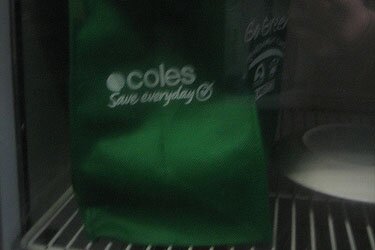
Photo by sheilaellen
Josh Solomons, Dry Goods Manager at Coles Neutral Bay, says that two items are required as a minimum before a customer will be offered a plastic bag.
But despite this policy stance, studies by GEJI journalists have revealed employees clearly fail to provide customers with this option.
“I wasn’t provided with the option of a plastic bag,” said Lucy Meagher, a 42-year-old resident, after purchasing a loaf of bread and a packet of chips. This instance was a common occurrence, particularly in the twelve items or less aisles.
Alicia Robitaille, a 21-year-old member of the Australian Conservation Foundation, is sceptical about the level of environmental aid provided by the major supermarkets, even despite the provision for customers to purchase cotton bags at the checkout.
“Green Bags are made of plastic and cotton, which is still harming the environment,” said Ms Robitaille. “I would like to see organic stores open where containers are used rather than bags”.
Cotton bags are widely regarded as environment-friendly. However, studies by the Finnish Environmental Institute reveal that they are not the best alternative. Large amounts of energy and irrigation water used in cotton production are creating high levels of greenhouse gases.
Coles supermarkets are attempting to address this concern, embarking on a new strategy aimed at improving their environmental image. As of 1 September 2009, all Coles retail outlets will implement the ‘Bags for Life Strategy’.
“Bags provided by this strategy will be cheaper and biodegradable,” said Mr Solomons. Biodegradable bags degrade into basic properties without any effect on terrestrial or aquatic organisms.
But according to Mary Coyle, a 75-year-old resident of Manly Vale, it is “big corporations” that are the problem. “Pollution, carbon and cars are all human caused and are affecting the climate,” she said.
♦♦♦♦♦♦♦♦♦♦♦♦♦♦♦♦♦♦♦♦♦♦♦♦♦♦♦♦♦♦♦♦♦♦♦♦♦♦♦♦♦♦♦♦♦♦♦♦♦♦♦♦♦♦♦♦♦
Follow us on Twitter: Gejinews
Dalida Makil, Florist, Bondi Junction
Are humans responsible for climate change?
“In one way yes, and in another no. Bringing in new things of course will change the climate but we cant blame ourselves.
Information about climate change is found from the feeling of what we’re living. Everyone has different opinions but we can all feel it.”
Derek Wilson, 64, Builder, Bondi vistor from New Zealand
“People are much more aware of climate change due to the increase of people with skin cancer.
Australia has a battle with climate change as it’s all politics. Politics wins the day and they are not really doing a successful job [rather] everybody needs to get listened too and involved.
We’re older and we have friends who have died from skin cancer, and what is causing it is the sun.
There is much coverage of climate change in the news media but I am personally aware of it because of my age.”
Kate Denny, 38, Office Worker, Vaucluse
“I question the human influence on climate change as the atmospheric change has always existed.
There is far too much panic regarding to climate change as knowledge of climate change is only 150 years old, the earth has been here much longer.”
Sherly Sitiawan, 27, Service Manager at Coles Surry Hills
What is the situation with Coles’ plastic bag policy?
“When I was working at Broadway, every staff member that works for 4 hours of more is only given two bundles of plastic bags. Since I’ve been working at Surry Hills the customers are really rude to the staff because of the plastic bags, so we don’t make a big deal about it.”
How often do you get complains about plastic bags from the customers about plastic bags?
“Every day. We even tell them that they can buy the green bag, but they don’t want to spend their money on it. Even though we offer them the Green Bag,they still ask for the plastic bag.”
Do you think the green bags are visible enough?
“Yes, we have them everywhere. Four boxes are sold every day, but people from certain age like the old people still want plastic bags over the Green Bags. They cost 99 cents for the plain one; the decorated ones are more expensive.”
Chris Momitsas, 48, Real Estate Agent, Sans Souci
Do you use plastic bags?
“I try not to, but sometimes it’s unavoidable.”
Do you find that you have the option of receiving one?
“Most of the time, depends on how nice the cahsier person is. But I mean, I’m from Greece and over there it’s completely different.”
Do you believe in climate change?
“Yes, of course.”
What has influenced your perspective on it?
“The increase in skin cancer. I just came back from Europe recently, and they have no sun glare. You stand here under the sun in Sydney, for more than an hour, you’ll feel it, you’ll feel burning. Where as in the Europe, you stay all day, its nothing, you just get tanned.”
Other than what you have just mentioned, do you have any other experience on climate change?
“Only what I see on the news and reading the newspaper. Every bag should cost a dollar. I mean they do it in Europe so why not here.”
Scott Whitney, 24, Owner of Frames Café, Surry Hills
What’s your view of plastic bags?
“It’s simply ridiculous. We get people in here everyday with plastic bags and places like Coles need to do something about it. There’s too many people with too little items in them. It’s just crazy. I‘m in. It’s just black or white, you get a plastic bag or you have a special bag.”
Do you use plastic bags?
“No I don’t I always have my big bag with me.”
Do you find that you have the option of receiving one?
“I never really get asked. So, no.”
Do you believe that climate change exists?
“Obviously, definitely because there’s been such dramatic change in weather from growing up till know – it’s quite noticeable.”
What has influenced your views?
“Just experience, general weather patterns and even what you see on the news. And it’s also what we’re doing you know what I mean? All the pollution and everything we’re doing to the earth.”
Have their been key factors that have influenced your views?
“Water rises and all those sorts of things you know what I mean. Spit Bridge is destined to be under water in the next 10 years you know what I mean.”
Richard Ensworth, 48, Psychologist, Coogee
Do you use plastic bags?
“Yes, sometimes.”
Do you find that you have the option of receiving one?
“I never get given the option no matter what store I visit.”
♦♦♦♦♦♦♦♦♦♦♦♦♦♦♦♦♦♦♦♦♦♦♦♦♦♦♦♦♦♦♦♦♦♦♦♦♦♦♦♦♦♦♦♦♦♦♦♦♦♦♦♦♦♦♦♦♦
Follow us on Twitter: Gejinews
Jacqui Henderson, Livia Parsito and Yammi Lee
Coles Town Hall is unsuccessfully implementing a plastic bag policy, with customers purchasing three items or less still being offered plastic bags.
Julieth Hernandez, service area manager at Coles Town Hall, says that it each store is different and faces different customer needs.
“There were issues with complaining,” Ms Hernandez said. “People saying that they’ve paid for a product so they should get a bag.”
However customers at the store seem to be in favour of the Green Bags, with half of their customers opting for a reusable bag. “We are pretty good compared to other stores,” Ms Hernandez said.
Coles Town Hall now offers its customers a range of coloured reusable bags, which are displayed below the counters. She attributes the success of reusable bags to the staff, who are responsible for their promotion.
A newly implemented recycling bin for plastic bags has not been as successful, with customers using it like a normal rubbish bin. The lack of customer recognition of bin’s potential annoys Ms Hernandez.
Sharon Hume, a 56-year-old local resident, is in support of policies aimed at reducing plastic bag usage. She said that plastic bags are “a terrible invention” because of their effect on the environment, and sees their phasing out as an attempt to “put nature back in balance”.
Michael Kennedy, a 44-year-old train driver, doesn’t see “what all of the fuss is about” and is certain that climate change is no a real problem. He says that that reusable bags create “just another tax” and are “an excuse” to fleece more money from customers.
Kylie Redden, 18, and a recruitment coordinator admits that she doesn’t know much about climate change, but she thinks that the big supermarkets’ plastic bag policies are positive. “I reckon it’s good,” she said.
|
Transaction
|
Number of Items |
Asked if wanted plastic bag? |
Had own bag |
| 1 |
3 |
yes |
no |
| 2 |
6 |
given automatically |
no |
|
3
|
2
|
yes
|
no
|
|
4
|
5 |
no |
yes |
|
5
|
8 |
given automatically |
no |
|
6
|
1 |
no |
no |
| 7 |
7 |
no |
yes |
| 8 |
11 |
no |
yes |
| 9 |
3 |
yes |
yes |
| 10 |
5 |
no |
yes |
| 11 |
1 |
yes |
no |
| 12 |
3 |
yes |
no |
| 13 |
2 |
yes |
no |
| 14 |
7 |
given automatically |
no |
| 15 |
5 |
no |
yes |
| 16 |
2 |
yes |
yes |
♦♦♦♦♦♦♦♦♦♦♦♦♦♦♦♦♦♦♦♦♦♦♦♦♦♦♦♦♦♦♦♦♦♦♦♦♦♦♦♦♦♦♦♦♦♦♦♦♦♦♦♦♦♦♦♦♦
Follow us on Twitter: Gejinews
Claire Morgan, Eric Barnes, Emily Ackew, Paul Nee
Coles fail to enforce environmental initiatives to combat Australia’s plastic bag consumption, despite clear company policies to encourage the use of Green Bags.
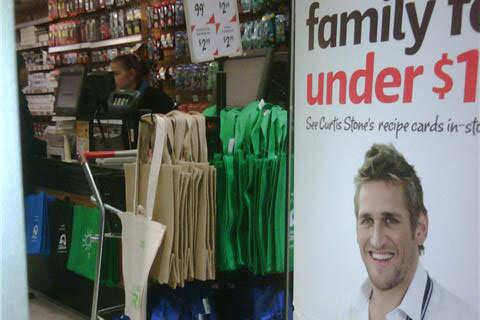
Photo by Jacqui Henderson, Livia Parsito, Yammi Lee
Eastgate and Westfield chains in Bondi Junction are both bound by the Australian Retailer’s Association (ARA) Code of Practice to reduce plastic bag usage throughout their stores, but evidence shows that these policies are not being enforced effectively.
“If a customer has three items or less, staff are not encouraged to give plastic bags unless asked,” said the Eastgate Coles Customer Service Manager. “But the procedure is not enforced.”
Coles did agree to the ARA Code of Practice to reduce plastic bag consumption by 2005. However, a 2009 survey of checkout procedures revealed plastic bags were issued to customers buying three items or less without being asked. These included portable items, such as bread and chewing gum.
The results highlighted that over 50% of customers with 3 items or less received plastic bags automatically. Customers were not offered alternative Green Bags or paper bags, and these were not made clearly visible in the stores.
The Customer Service Manager said: “the older demographic in the Eastern suburbs love their plastic bags…The customer gets what they want.”
Jim Cooper, Coles Myer Media Manager, was unable to confirm a plastic bag reduction policy exists. “I would need to check with our stores to see if any policy is in place,” he said.
The Eastgate CSM said that the three-items-or-less initiative was not an “official store policy per se”.
The Westfield Coles Store Manager declined to comment on whether a policy is in place for the plastic bag management.
Derek Wilson, a 64-year-old Eastern Suburbs resident, said: “something’s got to be done and everyone needs to play their part in saving the environment”.
♦♦♦♦♦♦♦♦♦♦♦♦♦♦♦♦♦♦♦♦♦♦♦♦♦♦♦♦♦♦♦♦♦♦♦♦♦♦♦♦♦♦♦♦♦♦♦♦♦♦♦♦♦♦♦♦♦
Follow us on Twitter: Gejinews
|
|











